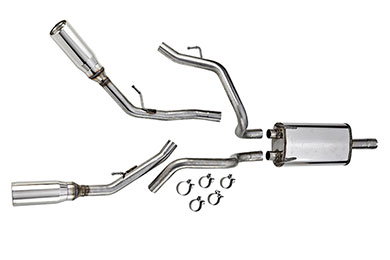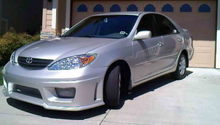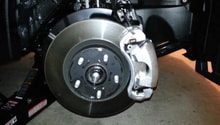Toyota Camry: Performance Modifications
Check out a couple of simple modifications you can make to your intakes, headers and exhaust system. You'll gain horsepower and performance that will make you glad you took the time.
This article applies to the Toyota Camry (1997-2011).
Whether you just jumped into your first Toyota Camry or this is another edition for a seasoned aficionado, it's no doubt there are some upgrades you are going to want to make. Maybe you want more horsepower, or a better sounding exhaust. It could quite possibly be that you simply want to improve your gas mileage. Let's look at three possible performance upgrades for your Camry.
Performance Modifications
There are three main modifications you can do here: intakes, headers, and exhausts. Each will have a variety of costs and each has a different skill level involved. However, they can be done by do-it-yourselfers with a little help and instructional guidelines. Let's look at each one.

Figure 1. Fine tune your systems for better performance. 
Figure 2. A new intake will make all the difference in the world.
Intakes

DIY Cost – $125
Professional Cost – $500
Skill Level – Easy; Doesn't require a lot of tools, relatively simple swapping out of part.
There are numerous possibilities for modifying your intake. That's the good news. The bad news is that the possibilities decrease if you live in California. If you make your home there, then you already know about the strict regulations you face. It doesn't mean you can't make the modifications; it simply means your options are fewer.
The highest recommended intake, no matter where you live, is the Weapon-R Dragon Intake System. It is one of the most highly rated intake systems in the world. What's even better is that it is already CARB certified so you will easily pass a smog test no matter where you live.
Reviews are varied, but many are reporting a huge difference in power and improved acceleration with this modification. Upgrading your intake will always make a difference in overall performance. It is a wise choice for this route on intakes. Recommended for those who desire a better breathing system for the engine.
Headers

DIY Cost – $300
Professional Cost – $1,500 - $2,000
Skill Level – Difficult; Considerably more is involved in this modification depending on how many catalytic converters (CATS) the car has, whether FLEX pipes are used, and whether or not the CATS need to be relocated.
This modification can bring with it a few complications. For example, does the car have two CAT systems? Removing one of them is illegal in most places. In some places, even changing the location of the CAT is illegal. An excellent choice (as pictured) is the OBX Header by OBX Racing Sports.
It's imperative that you check local regulations within your state. If you miss this and your state requires an inspection, your modification could cost you much more than you planned on. Recommended for those for who want to want a little extra HP from aiding in exhaust efficiency.
Exhausts

DIY Cost – $400 - $600
Professional Cost – $800 - $1,300 (Labor Cost = $700)
Skill Level – Moderate; the main difficulty here is making sure your pipes are cut to the right lengths, etc.
If you're looking for power, this is the modification to make. Customizing your Camry's exhaust system makes sure that your engine will perform at its best, often up to a 10% increase in horsepower. With the increased power you will love driving on hilly roads and other demanding terrains. Bosal, Flowmaster, MagnaFlow or Weapon-R exhaust systems will make a huge difference in your car's performance. Recommended for those who want to gain HP while also adding a new tone to the car.
Pro Tips
As mentioned above, the one thing complicating some of your modifications are the emission laws that vary from state to state. With that in mind, here are a couple of extra tips.
- Make sure you check regarding your state regulations BEFORE you begin. You don't want this fun modification to end up costing you through the nose.
- After you make your replacements, it's a good idea to keep all the old parts. This will be helpful if you sell your car, or if you move to another state where the emission laws are different.
Related Discussions
- Best Intake for a '99 Camry - Camryforums.com
- Headers, Intake, & Exhaust - Camryforums.com
- Header Options - Camryforums.com






